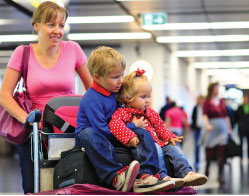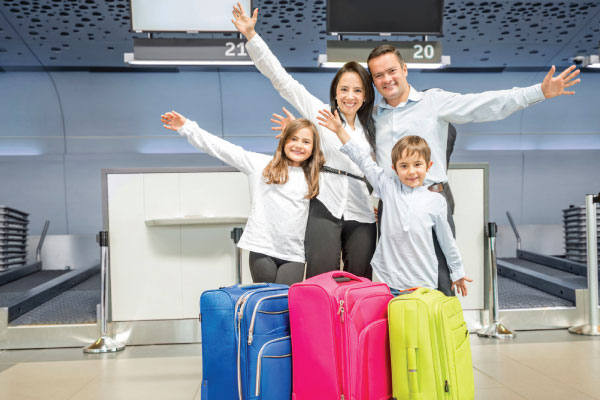While your children are little, you might think it sensible to put off any ambitious travel plans. But as Dr Jinan Harith Darwish tells us, it’s worth reconsidering. Follow her tips and don’t let your children, and the whole family, miss out on all the enriching learning opportunities.
What must I take with me?
A well-stocked, lightweight travel first aid kit is indispensable for travelling with kids. Include these items:
• Over-the-counter pain medications: acetaminophen and ibuprofen.
• Oral antihistamine medication.
• Pedialyte powder packets for rehydration.
• Polysporin or Neosporin one per cent hydrocortisone cream.
• Anti-itch gel or cream.
• Antibacterial hand wipes or alcohol-based hand sanitizer containing at least 60 per cent alcohol.
• Sunscreen 50 SPF.
Don’t forget any prescription medications (such as inhalers for asthma or insulin injections or Epi-pen) your child uses regularly that might be hard to find or refill overseas.
How do I protect my child against mosquitoes?
Pack the following:
• Lightweight, long-sleeved shirts, long pants and a hat.
• Insect repellent containing up to 10 per cent DEET.
• In malaria-risk areas, pack bed nets treated with permethrin if you are not sleeping in an air-conditioned or well-screened room. You can also buy permethrin or deltamethrin to treat bed nets and clothes overseas. Follow the directions to ensure safe use.
What vaccinations does my child need?
 First and foremost make sure your child’s regular vaccinations are up-to-date. Then, talk to your paediatrician to learn what other vaccinations your child will require for your destination. Have your child get any necessary vaccinations at least six to eight weeks before travelling to ensure he has built up sufficient immunity.
First and foremost make sure your child’s regular vaccinations are up-to-date. Then, talk to your paediatrician to learn what other vaccinations your child will require for your destination. Have your child get any necessary vaccinations at least six to eight weeks before travelling to ensure he has built up sufficient immunity.
Travel vaccines that may be recommended depend on where you are going, what you plan to do while you are there, how long you are staying and the age of your child. Common vaccinations required for overseas travel include hepatitis A, typhoid, meningococcal, travellers’ diarrhoea and cholera. If you are travelling to an area with measles, make sure your child gets the MMR (measles, mumps, and rubella) vaccine. If you are travelling to an area where malaria is present, you and the rest of your family will need to take medication to prevent it.
How can I alleviate my child’s discomfort during aeroplane pressurisation?
To avoid ear aches from the change in air pressure during take-off and landing, offer your child something to eat or drink. Both pretend yawning and swallowing help ease the pressure and clear the ears by working the muscles that control the eustachian tubes.
Can you do something about jet lag?
There is no safe medication for children to help with jet lag. The best thing you can do is to switch over to the local time as soon as you arrive at your destination. Make sure your children are exposed to sunlight during the day, which helps the body acclimatise to the local time more quickly. It can take about two weeks to fully adjust to a new time zone. Do not skip regular bedtimes and naps just because you are on holiday. Try to stick to your ordinary sleep and nap schedule so your children stay rested.





































